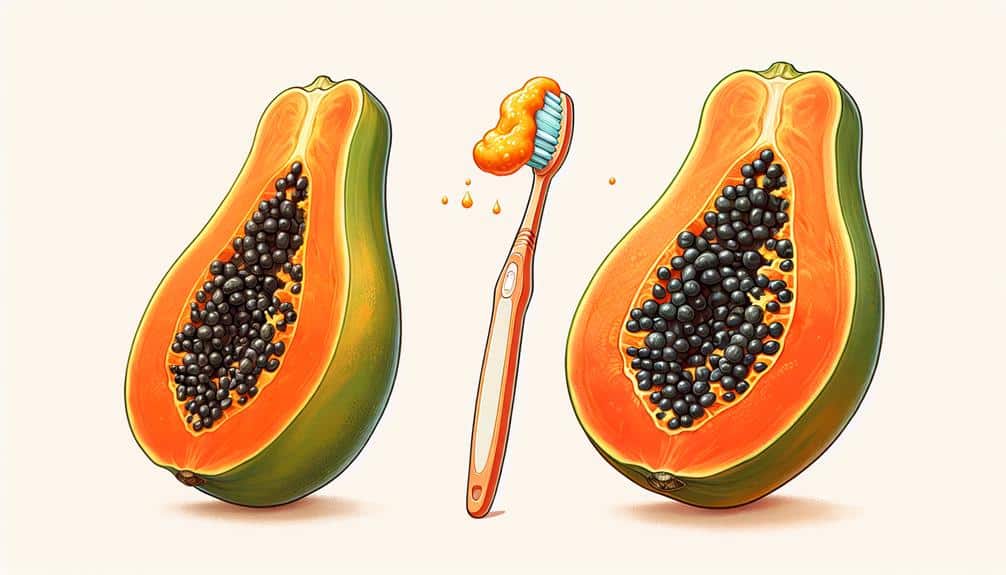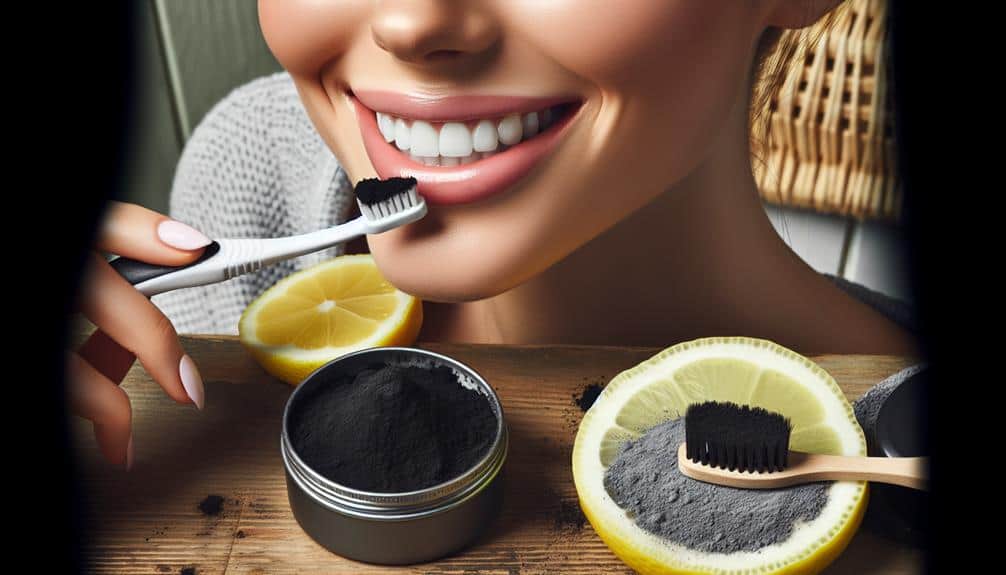Enhance your smile naturally with papaya enzyme for effective teeth whitening. Papain in papaya breaks down stains and plaque, promoting good oral hygiene by reducing bacteria buildup and removing dead cells for whiter teeth. Combat bad breath with its antibacterial properties for fresher breath. To make a paste, blend ripe papaya with honey and baking soda. Apply gently 2-3 times a week for 4-6 weeks with a soft-bristled toothbrush. Guarantee proper usage and consult professionals for realistic results and maintain your brighter smile through careful aftercare. Choose reputable brands to sustain whitening.
Key Points
- Papaya enzyme aids in natural teeth whitening by breaking down stains and plaque.
- Use DIY papaya enzyme paste with honey and baking soda for effective whitening.
- Apply gently 2-3 times weekly for 4-6 weeks for noticeable results.
- Follow usage instructions to prevent tooth sensitivity and enamel damage.
- Maintain results with proper oral hygiene and avoid staining foods and drinks.
Benefits of Papaya Enzyme for Teeth
Papaya enzyme offers natural teeth whitening benefits by gently breaking down surface stains and plaque, revealing a brighter smile. Enzymes like papain found in papaya have been shown to have a positive effect on oral health. This enzyme helps in breaking down proteins, which can aid in removing plaque and stains from the teeth. By promoting a cleaner mouth environment, papaya enzyme contributes to overall oral health.
Regular use of papaya enzyme can assist in maintaining good oral hygiene by reducing the buildup of bacteria that can lead to cavities and gum disease. The gentle exfoliating properties of papaya enzyme help in removing dead cells from the teeth, making them appear whiter and brighter. Additionally, the antibacterial properties of papaya enzyme can help in combating bad breath, promoting fresher breath throughout the day.
Incorporating papaya enzyme into your oral care routine can offer a natural and effective way to enhance your smile while supporting your overall oral health.
How to Make Papaya Enzyme Paste
To create a potent papaya enzyme paste for teeth whitening, gather ripe papaya, honey, and baking soda. Papaya contains papain, an enzyme known for its teeth-whitening properties. Start by peeling and deseeding a ripe papaya. Cut it into small pieces and mash them into a smooth pulp.
Add a tablespoon of honey to the papaya pulp; honey is a natural humectant that can help retain moisture in the paste. Next, mix in half a teaspoon of baking soda, known for its gentle abrasive properties that can aid in removing surface stains from teeth. Blend the ingredients thoroughly until you achieve a consistent paste-like texture.
Your DIY papaya enzyme paste is now ready for use. This homemade paste offers a natural alternative to commercial teeth whitening products and can be a cost-effective solution for achieving a brighter smile. Experiment with different papaya enzyme recipes to find the one that works best for you.
Application and Usage Instructions
For best results, apply the papaya enzyme paste to your teeth gently using a soft-bristled toothbrush. Proper technique is vital to guarantee even coverage and effectiveness. Brush your teeth with the paste for about 2 minutes, making sure to reach all surfaces.
It's advisable to use the papaya enzyme paste 2-3 times a week for a duration of 4-6 weeks to see noticeable results. However, following the instructions provided by the specific product or brand you choose to use is key. While papaya enzyme is generally safe for most people, potential side effects such as tooth sensitivity may occur in some cases.
Before starting the whitening regimen, consider checking before and after photos, customer reviews, and seeking professional opinions to set realistic expectations. Look for reputable brands known for their quality and efficacy in producing papaya enzyme teeth whitening products.
Precautions and Safety Tips
When utilizing papaya enzyme teeth whitening products, make sure to follow recommended usage guidelines and consult with a dental professional if you experience any negative effects. To guarantee sensitivity management during whitening treatments, it's important to apply the papaya enzyme product as directed and avoid overuse. If you have a history of sensitive teeth or gums, consider using a desensitizing toothpaste before starting the whitening process to help protect your enamel.
Enamel protection is essential when using any teeth whitening products, including those containing papaya enzyme. To safeguard your enamel, refrain from using papaya enzyme products excessively or leaving them on for longer than recommended. Additionally, consider using a soft-bristled toothbrush and gentle brushing motions to prevent enamel erosion during and after whitening treatments.
Results and Maintenance Recommendations
Proper maintenance and consistent care are essential for achieving long-lasting results after using papaya enzyme teeth whitening products. To guarantee the long-term effectiveness of your whitening treatment, follow these recommendations:
- Use Recommended Products: Choose toothpaste and mouthwash that are specifically formulated to sustain teeth whitening results. Look for products that contain ingredients like papain (papaya enzyme) to help maintain your brighter smile.
- Avoid Common Mistakes: To prevent staining and maintain the whiteness of your teeth, steer clear of foods and beverages that are known to cause discoloration, such as coffee, tea, and red wine. Additionally, refrain from smoking, as tobacco can quickly diminish the effects of teeth whitening.
- Establish an Aftercare Routine: Brush your teeth at least twice a day and floss daily to remove plaque and prevent yellowing. Regular dental check-ups and professional cleanings are also essential to sustain your whitened teeth for the long haul.
Frequently Asked Questions
How Long Does It Take to See Results From Using Papaya Enzyme for Teeth Whitening?
To see results from using papaya enzyme for teeth whitening, it typically takes a few weeks. The effectiveness depends on consistent application. Apply the product a few times a week for best results. Remember, individual outcomes may vary.
Can Papaya Enzyme Cause Sensitivity in Teeth?
To prevent teeth sensitivity, you should consider alternatives to papaya enzyme for whitening. Protect your enamel by using gentle whitening products. Sensitivity can be caused by harsh treatments, so opt for safer options.
Are There Any Specific Dietary Restrictions While Using Papaya Enzyme for Teeth Whitening?
When using papaya enzyme for teeth whitening, follow dietary recommendations to enhance enzyme effectiveness. Avoid acidic foods and beverages that may counteract the benefits. Opt for a balanced diet rich in vitamins and minerals for best results.
Can Papaya Enzyme Be Used on Dental Work Such as Crowns or Veneers?
When it comes to dental restoration, it's essential to take into account the compatibility of papaya enzyme. While this natural remedy can aid in whitening teeth, precautions must be taken to safeguard enamel on crowns or veneers.
Are There Any Potential Side Effects of Using Papaya Enzyme for Teeth Whitening?
When using papaya enzyme for teeth whitening, be aware of potential risks like tooth sensitivity. Take precautions by consulting your dentist. Long-term benefits may include gentle whitening, but proper use is essential to avoid adverse effects.



